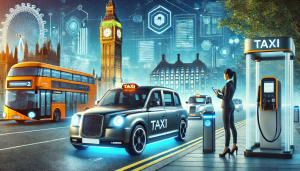
Rapid technological improvements and shifting consumer expectations have led to a dramatic overhaul of the UK taxi sector in recent years. In order to remain competitive and satisfy the needs of the contemporary client, taxi services are changing from the classic black cab to private hire cars. This article examines how technology is changing the taxi business in the UK and the creative tactics businesses are using to prosper in the digital era.
The Rise of Ride-Hailing Apps
Rapid technological improvements and shifting consumer expectations have led to a dramatic overhaul of the UK taxi sector in recent years. In order to remain competitive and satisfy the needs of the contemporary client, taxi services are changing from the classic black cab to private hire cars. This article examines how technology is changing the taxi business in the UK and the creative tactics businesses are using to prosper in the digital era.
Although ride-hailing services once posed a serious threat to traditional taxi operators, many have since embraced comparable technologies to effectively compete. Apps such as Gett and Hailo, for instance, are making London’s famous black taxis more widely accessible and providing a smooth booking experience.
Cashless Payments and Digital Wallets
Both drivers and passengers would gain from this shift to cashless transactions. Carrying cash reduces the hazards for drivers while providing passengers with a hassle-free experience. Digital payment systems also simplify accounting and financial reporting, which helps business owners run their companies more effectively.
Electrification and Environmentally Friendly Projects
The taxi sector is adopting more environmentally friendly options as the UK government steps up its attempts to cut carbon emissions. Hybrid taxis and electric cars (EVs) are becoming more and more popular, especially in big cities like London. This shift has been sped up by initiatives like Transport for London’s (TfL) mandate that new cabs adhere to zero-emission requirements.
Additionally, businesses are spending money on infrastructure for charging their electric fleets. For example, Uber has introduced its Clean Air Plan, which aims to make the platform emission-free in London by 2025 and offers financial incentives to drivers who convert to electric vehicles. Comparably, producers of black taxis are launching electric versions like as the LEVC TX, which blends classic styling with state-of-the-art environmentally friendly technology.
Advanced Navigation and AI Integration
Artificial intelligence (AI) and sophisticated navigation technologies are being used by contemporary cab firms to streamline operations. By assisting drivers in navigating traffic and cutting down on journey times, GPS technology guarantees precise and effective route planning. Ride-hailing applications’ AI-powered algorithms also pair drivers with passengers in the vicinity, cutting down on wait times and increasing fleet efficiency.
To foresee demand trends and strategically deploy drivers, some businesses are experimenting with predictive analytics. For instance, AI algorithms can forecast areas where ride demand are anticipated to spike during busy times or significant events, guaranteeing sufficient coverage and cutting down on client wait times.
Improved Customer Satisfaction Through Customization
In an effort to increase customer happiness, taxi services are increasingly focusing on personalization. Apps for ride-hailing gather information on user preferences and behavior so they can provide customized services. The user experience is improved by features like customized ride recommendations, saved destinations, and preferred driver options.
Additionally, businesses are using feedback mechanisms to guarantee high-quality services. The ability for passengers to comment and review their drivers helps to uphold high standards and quickly resolve problems. Some platforms further encourage customer retention by providing discounts and loyalty programs for regular users.
Combining Public Transportation
In the UK, a lot of taxi services are integrating with public transportation networks to provide a smooth travel experience. These days, ride-hailing applications come with tools that let users arrange multimodal trips that combine cabs with buses, trains, or bicycles. This strategy promotes the use of environmentally friendly transportation solutions in addition to offering convenience.
To encourage environmentally responsible mobility, the Free Now app, for instance, has a function that lets users reserve electric bikes and e-scooters in addition to taxis. These integrations aid in easing traffic in crowded cities and are consistent with more general urban mobility objectives.
Obstacles and Prospects
Notwithstanding the many developments, the UK taxi business still has a number of obstacles when it comes to embracing contemporary technologies. Traditional operators and ride-hailing services continue to clash over regulatory matters including licensing requirements and competition rules. Furthermore, smaller operators may find it difficult to implement new technology due to their high cost, such as sophisticated software and electric cars.
But as long as the sector keeps coming up with new ideas, the future appears bright. With businesses like Waymo and Uber making significant investments in self-driving technology, autonomous cars are becoming a reality. Autonomous taxis have the potential to significantly transform the business by lowering costs and increasing accessibility, even though mainstream deployment might take years.
In conclusion
Technology breakthroughs and changing customer demands are causing a significant upheaval in the UK taxi sector. The industry is embracing innovation to remain competitive and satisfy the demands of contemporary passengers, from ride-hailing apps and cashless payments to electric cars and AI-driven solutions.
Collaboration between tech firms, regulators, and legacy operators will be essential as the industry develops to create a sustainable and customer-focused future. Taxi services in the UK are well-positioned to prosper in an increasingly digital world by utilizing technology and tackling new issues.





